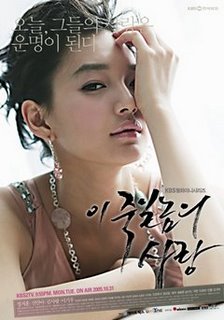A Love to Kill

 A friend of mine, who moved to Seattle from Vietnam not many years ago, loaned me her DVDs of the popular Korean series A Love to Kill. The male lead is rock star Rain, and his beloved/hated costar is Shin Min-ah, both pictured here.
A friend of mine, who moved to Seattle from Vietnam not many years ago, loaned me her DVDs of the popular Korean series A Love to Kill. The male lead is rock star Rain, and his beloved/hated costar is Shin Min-ah, both pictured here.I watched about an hour of the eight discs before I gave up, totally baffled as to what was going on. At my friend’s urging, I had watched one episode on TV previously and was equally mystified. Part of the comprehension problem is the English translation. My friend frets over her English, which is actually quite good, but she admitted that her own grammar is clearer than the subtitles on A Love to Kill.
Or maybe the lack of comprehension is do to my Western mind being unable to wrap itself around the contemporary Asian concepts of drama and love. I did get that everyone is unhappy. Extreme close-ups of tears coursing down gorgeous faces got that idea across without any words.
And that’s what I’m writing about today. Why do women of all cultures fall for the jerks? Why do we work so hard at being miserable? When are we ever going to learn that nice guys are best? That it's okay to be happy? I’m guilty myself of perpetuating the myths. I write romances (www.linda-wallace.com) in which the heroines agonize over, if not exactly jerks, inappropriate men. Of course, without conflict there’s no drama, but I worry about the messages books and movies send to women. The universal appeal of the bad boy.
In one of the scenes I watched from A Love to Kill (also known as This Love I Want to Kill/The Love of Death/Detestable Love/Knock Out by Love), the hero, Kang Bok-ku, watches a young woman, tears streaming down her face, prepare to leap from a bridge to her death. He says something like "go ahead," strolls away, and she jumps. He keeps going for a bit then apparently decides maybe he’d better do something about it after all and saves her. A real champ, right? This is the same fellow who makes a living by theft and extortion. Oh, and he’s a kick-boxer. Definitely worthy of being chased by every female character in the series. My Vietnamese friend says, "His heart is deep." Maybe. Or maybe he’s a jerk.
In Bok-ku’s defense(?) he has determined to spend his life with Han Da-jung as a reward to her for saving his life. I guess that could be considered a worthy cause. But he’s distracted when his brother steps off the guardrail of his house while reaching toward the face of Cha Eun-suk (the one in the photo) on an electronic billboard with the announcement of her engagement to a rich heir. With his brother now in a vegetative state, Bok-ku becomes film star Eun-suk’s bodyguard to make her fall in love with him so he can avenge his brother.
Does that make him a man of honor? Worth all those tears? Or just a jerk?


1 Comments:
I imagine the attraction is, "Yes, he's a jerk, but I'll be the one to change him!" That's how so many of the old Harlequins worked, after all ... those cold, bitter, mean heroes reformed by the love of the (just barely legal, in some cases) heroine.
And that's why it's fiction -- in real life, I have my doubts whether jerks can be reformed, but in fiction, anything is possible. In my own work, FESTIVAL OF STARS, the hero has identity issues up the ying-yang. In real life, he'd be a piece of work ... but in my story, he gets help, learns to understand himself, and works through his problems.
On the other hand, since the Koreans seem to be making a real rep for themselves with love stories (an earlier series apparently was a huge hit both in Korea and Japan, linking those countries in unexpected ways), I'd wonder if you could get a good translation of that series. Worth a thought.
Post a Comment
<< Home